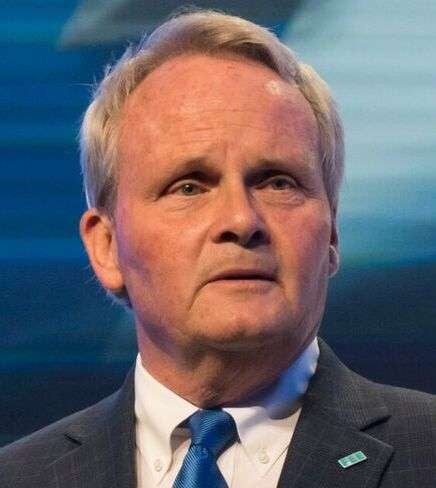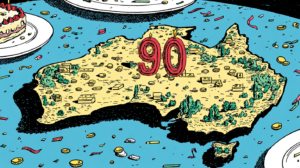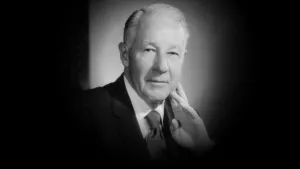Freedom and Knowledge Have Gained the Upper Hand
As the twentieth century draws to a close and a new millennium begins, should we be optimistic or pessimistic about the course of the human race?
Expect pundits and prognosticators of every persuasion to be offering up their views on this weighty question between now and the year 2000. Count me among the optimists. Not since the Enlightenment swept Europe in the eighteenth century have so many trends been moving in the right direction at one time. Let me make my case.
In political and economic terms, this century began inauspiciously. Individual liberty, free markets, and representative government were in retreat, socialism and dictatorship were advancing all over the globe. Two world wars and a great depression were followed by widespread acceptance of the fiction that governments should heavily spend, tax, and regulate. Communism—the state in charge of everything—claimed to be the wave of the future and millions believed it.
Today, the values of limited, representative government predominate from Moscow to Manila. A chunk of the Berlin Wall sits on the grounds of the Ronald Reagan Library in California. Protectionism is receding as barriers to trade come down. In dozens of national capitals, the public policy debate now turns on how much less government should do, not on how many new duties to give it.
Among intellectuals, the trend is decidedly in one direction—toward liberating individuals from the constraints of statism. The world is full of former socialists; I don’t know any former advocates of the free market who have undergone any comparable philosophical transformation. The staggering volume of publications and conferences pouring forth from free-market groups dwarfs anything coming from other directions.
Reinforcing these anti-statist trends is an information/technology revolution that is empowering individuals to take charge of their lives, start new businesses, and communicate freely and instantaneously with others in every corner of the earth. New discoveries and productivity gains are making capital and labor more mobile than ever before, bringing higher living standards almost everywhere.
In a 1988 study, The Twilight of Government Growth in a Competitive World Economy, Richard B. McKenzie suggested that one of the greatest threats to the march of the omnipotent state was the personal computer:
These words are being typed in a plane at 33,000 feet en route to St. Louis. The computer I am using is about the size and weight of a small box of Tide but has the internal memory of the University Maryland’s entire computer center when I was a graduate student there two decades ago. I carry in my shirt pocket enough disks to conduct the business of a modest-size firm. Yet any such observation about the small size but great power of modern computers is remarkable only because it is no longer astounding.
Nonetheless, the computing power on my lap represents an immense, not fully recognized, threat to the economic and political power of the U.S. government and other governments around the world. At the same time, my computer represents a liberation of “people power,” because technology is changing the nature of capitalism. Capital is being freed from the strict confines of arbitrary national boundaries; it is becoming internationalized to an extent never before imagined. As a consequence, the power of government to tax and regulate may be in its twilight years.
Not long ago, we were awash in predictions about an imminent crisis in natural resources. In the ’70s, forecasters were warning of increasing scarcity and rising commodity prices. An American president in a woolen cardigan gave us a fireside lecture about why we would have to hunker down, settle for less, pay more at the gas pump, even adjust our thermostats and throw more blankets on our beds.
A funny thing happened on the road to disaster: factoring out inflation, natural resources are now half as expensive as they were in 1980. Between 1980 and 1992, the worldwide inflation-adjusted price of food declined by 49 percent; timber, by 13 percent; and petroleum, by 62 percent. Cato Institute economist Stephen Moore says the next century may be “the first era in the history of humanity that natural resource scarcity ceases to act as a significant constraint on economic growth.”
The astonishing progress in lengthening life ranks as one of humanity’s greatest triumphs. Capitalist countries have slashed infant mortality and added 15 to 20 years to the average life span since 1900. Life expectancies even in poor countries, with few exceptions, have risen more since 1950 than in the previous 3,000 years. While some may argue the world has too many people, this startling fact cannot be ignored: the earth today sustains more than 5 billion people living far longer and at far higher standards on average than was the case for the mere 1 billion the earth sustained less than two centuries ago.
In the United States and many other countries, the environment is generally on the mend. The air is cleaner, the water is purer. Conditions that once spawned deadly plagues and diseases that killed or crippled vast numbers of people are few and far between, or relegated to historical footnotes. The cover story of the April 1995 Atlantic Monthly declared, “[T]he vast reforestation of the eastern United States is the most important environmental story in the nation—one with worldwide implications.”
Not all is well, to be sure. Dictatorships still exist. Ignorance about the imperatives of liberty and free enterprise can be found without looking any further than the nearest university. Wars haven’t disappeared. Pockets of poverty, disease, and environmental degradation persist. But these scourges are increasingly the exceptions in a world where they were once the rule. Their greatest enemies—freedom and knowledge—have gained the upper hand and promise us more progress for as far as the eye can see.
Historians record that on the eve of the last millennium, around the year 999, the world was rife with dire predictions about the future. Prophesying doom and gloom was the growth industry of the day. This time around, it looks like billions of people will be too busy making the world a better place to indulge in self-fulfilling defeatism.
So there’s my vote. As 2000 approaches, I cast my ballot for optimism.




